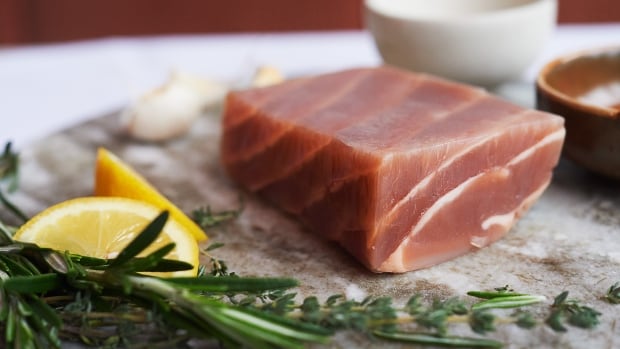It’s coming to a plate near you: seafood not fished out of the sea, but engineered in a lab. And Toronto startup New School Foods is banking on its artificial salmon making a splash in the plant-based alternative market.
“What we’re really recreating here is the sensory experience, the texture of salmon,” said Chris Bryson, the company’s founder and CEO.
He said the whole fillet is one of the first products of its kind. Developed using new technology to create muscle fibers made entirely of plants, it promises to look and taste like the real thing.
Made with seaweed, seaweed and plant protein, New School’s salmon substitute aims to replicate the nutritional profile of real salmon by adding omega-3 and omega-6 fatty acids, iron and vitamin B12.
Bryson said this is a top priority for consumers concerned about the health effects of real salmon, which may contain mercury or microplastics. He also promotes plant-based alternatives as a better choice for the environment.
“Learning how unsustainable our food system is… ranching is responsible for a tremendous amount of deforestation and greenhouse gases, the oceans are extremely overfished, so it’s very clear we need better diets.”
According to New School Foods founder and CEO Chris Bryson, consumers are concerned about the health effects of real salmon, which may contain mercury or microplastics. He also says plant-based alternatives are a better choice for the environment. (Derek Hooper/CBC)
Cook some competition
Plant-based seafood is slower to market than other meat alternatives because it’s more complex to develop, but some Canadian companies are diving in.
Victoria-based Save da Sea is reinventing vegetables, making smoked salmon from carrots. TMRW Foods, headquartered in Port Coquitlam, BC, cooks jackfruit crab cakes, while Vancouver-based Konscious Foods offers plant-based sushi. All three companies hit store shelves in the past year, being acquired by major retailers like Walmart, Loblaws, and Whole Foods.
Based in Victoria, Save da Sea has made plant-based smoked salmon from carrots. Other Canadian companies that have jumped into the field include TMRW Foods, which makes jackfruit crab cakes, and Konscious Foods, which offers plant-based sushi. (Save the sea)
These startups come at a difficult time for the industry. Plant-based meat alternatives have been launched amid major hype, with U.S. grocery store sales soaring 45 percent in 2020, according to the Good Food Institute, a U.S. nonprofit that promotes alternatives to animal products . Since then, consumer enthusiasm has waned, leading to a drop in supermarket sales. Industry analysts say some consumers don’t want to pay the high prices of many products, while others may not have been won over by the taste.
“It was a result of not having enough momentum to get the next wave of consumers to try this category,” said John Baumgartner, New York-based chief executive of Mizuho Securities.
Baumgartner is following the sector and said while it’s still a work in progress, there’s more momentum in the plant-based seafood space. The industry is still investing billions of dollars in plant-based alternatives, and new product innovations could be the cure for declining sales.
“We definitely think there’s a market for it,” he said. “The question is how quickly culture can change… Much of this adoption of plant-based meats needs to be anchored in the diet.”
show me the menu
Restaurants have caught on, with nearly half of all restaurants in the United States offering plant-based alternatives, according to the San Francisco-based Plant Based Foods Association.
In Canada, some product launches have proven more successful than others. A&W and Burger King both offer plant-based burgers; Tim Hortons added Beyond Meat products to its menu in 2019 but quickly withdrew them in 2020.
“There is demand, and we see demand through research and inquiries from our own guests,” said Brandon Thordarson, corporate executive chef for Vancouver-based restaurant chain Moxie’s.
The menu at Moxie’s. The restaurant chain started offering plant-based burgers a few years ago and is seeing growing demand for meat substitutes. (Andrew Lee/CBC)
The chain added plant-based burgers to the menu a few years ago. While initially about 15 percent of customers were looking for meat substitutes, it’s now about 25 percent, Thordarson said, adding that he has no plans to introduce artificial fish just yet, but it’s always a possibility.
“Whether it’s a Beyond Meat burger or … fake chicken or tempeh or tofu or whatever, it’s not going away.”
New School Foods plans to partner with Canadian chefs and introduce its product to restaurants before venturing into grocery stores. Bryson said he hopes artificial salmon can catch on and prove plant-based foods aren’t a fad.
“We as an industry really need to move to the point where we balance taste, price and texture,” he said. “Then I think you’re going to see a much broader acceptance at that point.”
Bryson, left, is shown in the New School Foods laboratory at Toronto Metropolitan University, where the company’s salmon substitute was developed. (Derek Hooper/CBC)
Don’t miss interesting posts on Famousbio
